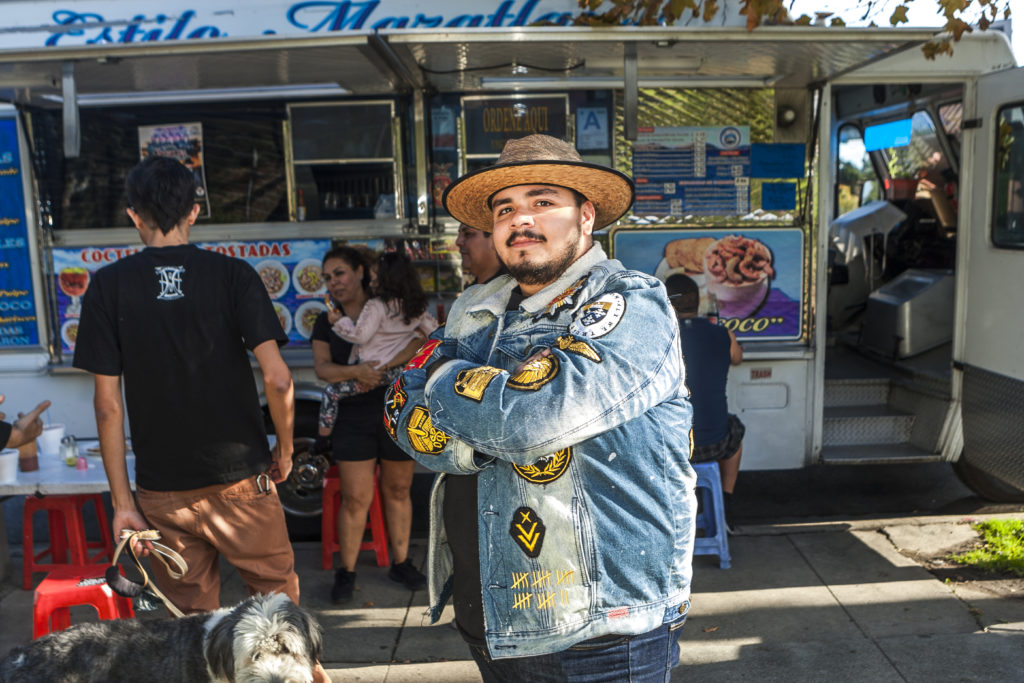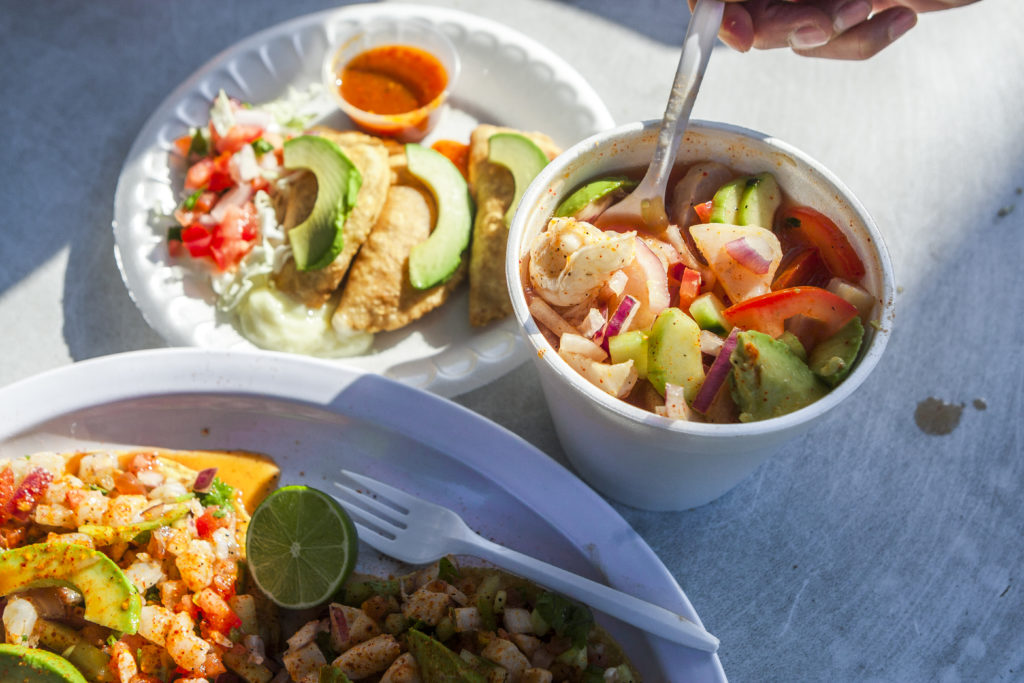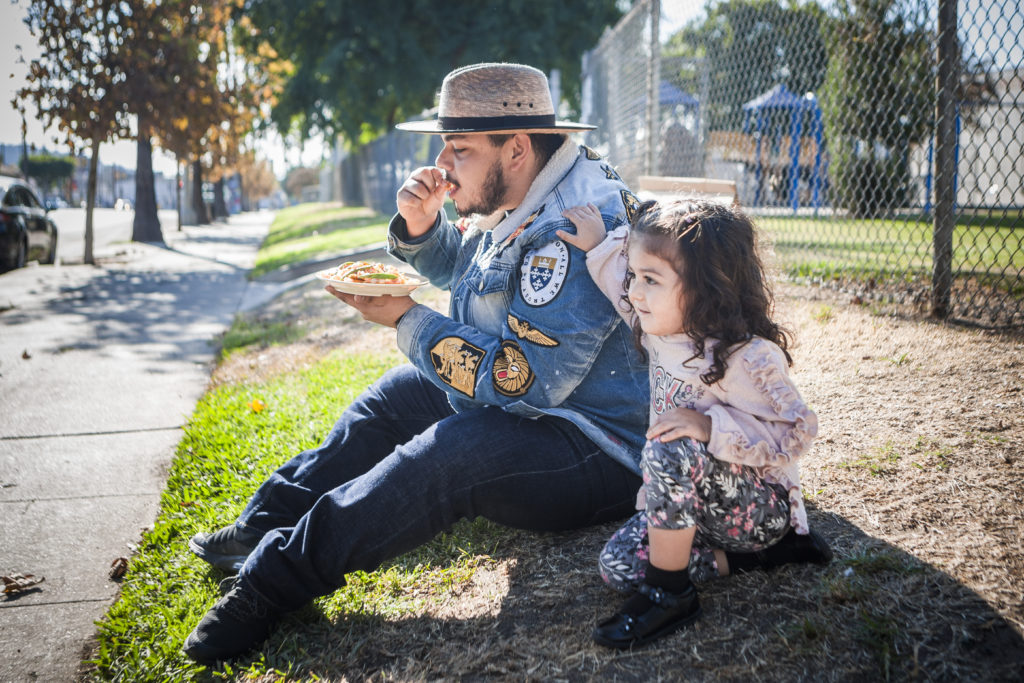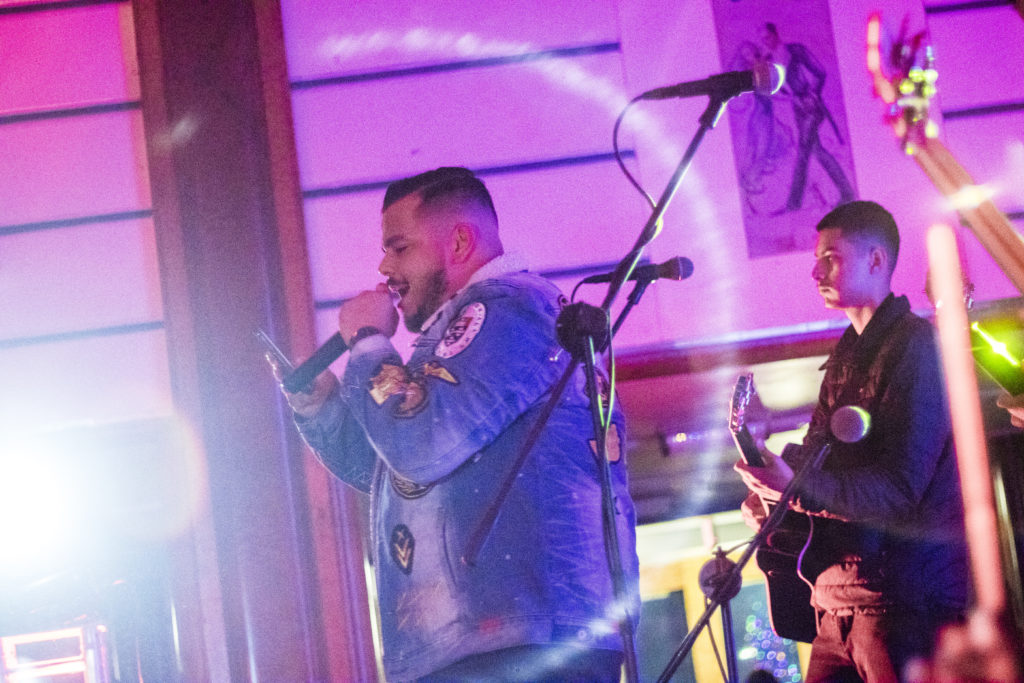
It’s Saturday afternoon on Marmion Way and Avenue 56 in Highland Park, and the smell of peeled shrimp and chiltepin chiles searing on a hot plancha perfumes the air. The ferocious picking of a 12-string guitar echoes through the intersection. A young man sings his heart out in Spanish, backed by a fast-paced Mexican polka beat heard through a speaker in a backyard. “En toditos los lugares, siempre lo miran pasar, disfrutando de la vida … el Angelino-Culiacán. Dicen que hay que confiar el guero, pero es mejor no confiar. Nunca olvides de donde vienes, aunque sepas a dónde vas.”
They are lyrics to an original corrido by Los Muchachos de Dena, a four-piece band made up of two Guatemalan American brothers and two Mexican Americans. Two of them are 18 and the other two are in their early 20s.
They all grew up in Highland Park and perform in backyards and the occasional Mexican seafood restaurant that doubles as a venue for this particular genre of regional Mexican folk music, which has exploded in popularity over the last decade on both sides of the border thanks to a wave of new young bands from Southern California like Los Muchachos that are bringing their own bicultural experiences to bear on a style that, up until recently, was only celebrated in the coastal Mexican state of Sinaloa.
In English, the lyrics to this self-titled song, “El Muchacho de [Pasa]Dena,” read like a poem, rife with references to a coming-of-aging spent in a neighborhood that has undergone as many changes as quickly as Highland Park.
“You’ll always see him walking by everywhere enjoying life… The Angeleno-Culiacán.
They say we should trust the white man, but it’s better to not give away your trust. Never forget where you come from, even if you know where you are going.”
While this song’s lyrics are focused on more of the storytelling side of this genre, corridos Sinaloenses have a lot more in common with hip-hop than anything else. They chronicle a life of gangs, drugs, cars, women and violence.
However, there is one thing that distinguishes the two raw genres of music: mariscos.

Aguachile, ceviche, coctel de camarón and oysters have become status foods. They’re the lifeblood of this flashy genre of music. Preferably, they’re paired with buckets full of ice-cold Mexican beer and bottles of Buchanan’s blended Scotch whisky — which, thanks to corrido rock stars who sing about it and chug it straight from the bottle in music videos (like Patrón or Hennessy in rap), have become the genre’s official liquor.
“El Muchacho de [Pasa]Dena” is a ballad modeled on Aresvi Ibañez, the 24-year-old frontman, who was born in Mazatlan, Sinaloa, and moved to Highland Park with his mother, Ana Victoria Ibañez, when he was 10 years old.
He is performing for a family gathering. There are at least 20 pounds of pristine Pacific shrimp for the grill, Sinaloa-style shrimp ceviche (made with bigger cuts instead of the mulched-up shrimp you see in most ceviche spots in the city), a big pot of shell-on shrimp soup, at least a hundred ice-cold Tecates and a couple bottles of Buchanan’s.
One of Aresvi’s uncles grabs a handful of raw shrimp and puts it on a plate. He then takes out his pocket knife, cuts up some serrano chiles and limes, grabs a handful of rock salt and creates a makeshift aguachile (a spicier variation of ceviche) as effortlessly as someone would assemble a ham-and-cheese sandwich in the States.
When I ask about his boss-level seafood literacy, Aresvi’s uncle responds, “I grew up next to a shrimp farm in Mazatlan, and as a child I used to buy five pesos worth of dog food, throw it in the tank so that all the fresh shrimp would jump out of the water, and then use my sombrero to catch as many as I could at a time for dinner.”
“When you’re from Mazatlan, mariscos is a part of you,” he tells me. This loud, proud and seafood-based way of celebrating life is the quintessential Sinaloan-Angeleno experience, something that this family continues to do both in their leisure time and at their family-run mariscos food truck, Mariscos El Faro, that sets up a mile north, in front of the Highland Park Recreation Center.

Despite the hot yoga studio and the $70-an-hour bowling alley that has transformed this part of Figueroa Street into a destination neighborhood, this unassuming food truck is putting out some of the best ceviche in L.A. “When listening to corridos, eating mariscos is the next best thing to being at the beach,” says Aresvi as he stuffs his face with an off-menu dish at Mariscos El Faro: a bed of Cheetos with a couple of heaping scoops of their fish and shrimp ceviches on top.
“The community has changed a lot in these last five years. It’s gone from mostly Latino to a lot of Americans who came out of nowhere,” Ana Victoria shares with me in Spanish back at the truck. “But the good thing is that everyone loves our [food], no matter the background.” This is mostly thanks to Ana Victoria’s partner, Noel Rayos, and his flavor-bomb interpretations of Sinaloan classics like callo de lobina, a ceviche made from salt-cured sea bass in inch-thick, sashimi-like slices, and empanadas de camarón, crispy masa turnovers filled with shrimp and served with electrically hot dried chiltepin chile salsa brought from Rayos’ hometown of Badiraguato, Sinaloa, where El Chapo is also from.
Like any other full-blooded Sinaloan, Aresvi has eaten mariscos almost every day since he was a child and has many seafood-based stories of growing up in Mazatlan. “I remember my uncle used to shuck fresh clams and feed it to me when I was just a little kid,” he says very humbly.
“I’m giving myself five more years doing this,” Aresvi says, clearing his sinuses in reaction to the fierce level of chiles in his custom ceviche. “If I don’t make it big, I’m going to go back to school and try something else.”
He and his band have big dreams of getting signed to Rancho Humilde or DEL Records, the two main labels that have minted other Modern Corrido hitmakers from the Southern California area including El De La Guitarra, Fuerza Regida and Arsenal Efectivo. El De La Guitarra’s hit “A Lo Lejos Me Veran” has over 72 million views on YouTube; Fuerza Regida has 56 million views for their anthem “Radicamos en South Central,” which celebrates being from South Los Angeles; and Arsenal Efectivo has nearly 9 million on their music video for “Lolo Felix” featuring low riders, palm trees and scantily-clad women.
According to Aresvi, what separates traditional corridos Sinaloenses and this new school of Southern California-based corridos is California’s weed culture. “Weed combined with corridos popped the fuck off,” he says. “They call them corridos verdes [green].”

In just three years of being together, and even with half of the band being underage, Los Muchachos de Dena has 17 original songs and is booked for parties almost every weekend. They charge $400 an hour, and if you want them to compose a custom song honoring you, they charge $2,000 for that.
This is a feat to admire in the extremely competitive scene in L.A. County, where hundreds of live corrido bands are all fighting for the same dream. Although, the band’s quick rise hasn’t came without risk. Aresvi will tell you about the crazy situations his music has gotten him into, from seeing happy and/or drunk partygoers shoot round after round into the air to playing for 16 hours straight at a kingpin’s secret rancho in the Inland Empire to almost getting beaten up by a bride’s family for not knowing the lyrics to “El Corrido Del Chapo.”
Ana Victoria is the one who worries the most. “I can’t go to sleep unless I know that he’s back home safe after a show,” she says as she serves him up another plate of ceviche.
“I invested so much money into private schools for him growing up and then he ended up singing?!” she jokes. But behind this tough love for her only child, she’s Aresvi’s number one fan. She claps, dances and sings along at every non-private show they perform.
“It’s just who we are as Sinaloenses,” Aresvi says unapologetically as we finish lunch. “We like our mariscos fresh and our corridos real, and you can’t have one without the other.”